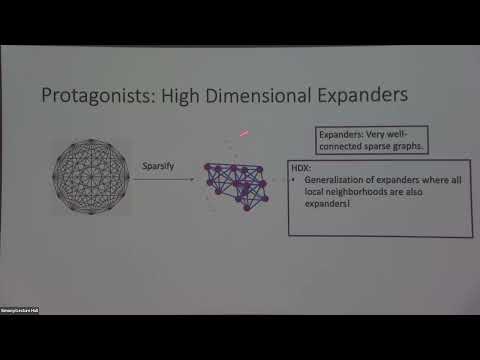Quasi-Linear Size PCPs with Small Soundness from High-Dimensional Expanders
Presenter
November 4, 2024
Abstract
The theory of probabilistically checkable proofs (PCPs) shows how to encode a proof for any theorem into a format where the theorem's correctness can be verified by making only a constant number of queries to the proof. The PCP Theorem [ALMSS] is a fundamental result in computer science with far-reaching consequences in hardness of approximation, cryptography, and cloud computing. A PCP has two important parameters: 1) the size of the encoding, and 2) soundness, which is the probability that the verifier accepts an incorrect proof, both of which we wish to minimize. In 2005, Dinur gave a surprisingly elementary and purely combinatorial proof of the PCP theorem that relies only on tools such as graph expansion, while also giving the first construction of 2-query PCPs with quasi-linear size and constant soundness (close to 1). Our work improves upon Dinur's PCP and constructs 2-query, quasi-linear size PCPs with arbitrarily small constant soundness. As a direct consequence, assuming the exponential time hypothesis, we get that no approximation algorithm for 3-SAT can achieve an approximation ratio significantly better than 7/8 in time 2^{n/polylog n}. In this talk, I will introduce PCPs and discuss the components that go into our proof. This talk is based on joint work with Dor Minzer and Nikhil Vyas, with an appendix by Zhiwei Yun. Our work builds on the recent construction of linear-size direct product testers with small soundness by independent works of Bafna, Lifshitz and Minzer, as well as, Dikstein, Dinur and Lubotzky.
